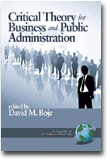
Critical Theory Ethics for Business and Public Administration
Edited by:
David M. Boje, New Mexico State University
A volume in the series: Ethics in Practice. Editor(s): Robert A. Giacalone, Texas State University. Carole L. Jurkiewicz, University of Colorado, Colorado Springs.
Published 2008
The purpose of this book is to develop those ethical traditions. For example, Horkheimer’s books Eclipse of Reason and Critique of Instrumental Reason, and his early and now classic essay Materialism and Morality ask for a reformation of Kantian ethics. The reform sought is that categorical imperative in an individualism capitalism serves to worsen the difference between business ethics and moral philosophy. That is, it is not enough to try to be good or ethical as individuals when it is the systemic processes that must be dealt with. Therefore, Horkheimer asks that the maxim that would be made universal be done at the level of people organizing with others to change the social system that is producing the unethical behaviors. The book is organized into several sections. The first section sets the stages, beginning with a challenge to the field of social responsibility in business and public administration (Jones, Ten bos, & Parker have a new book out that is smashing). Then, we turn to Carr and to Zanettic who each have done critical theory work in public administration. This is followed by Heather Hopfl, who edited an issue on ethics of goodness, and does the kind of writing that makes deep connections. The next set of chapters make topic connections: rhizomatics, dialogics of co experience, story/narrative, and postmodern. The third set of topics focus on application: technofuturist, international business, economics, university, environment, accounting, spirituality, strategy, and ending with Mills’ work on silence of race/ethnicity in business (and public administration) ethics writing.
CONTENTS
Series Editors’ Preface. Foreword: Critical Theory, Ethics, and the Critique of Business, Douglas Kellner. PART I: INTRODUCTION TO CT ETHICS IN BUSINESS AND PUBLIC ADMINISTRATION. Contributions of Critical Theory Ethics for Business and Public Administration, David M. Boje. Ethics in the World of Management?: Making the Case with Critical Theory, Adrian N. Carr. Practicing Critical Theory in Public Administration, Lisa A. Zanetti. Business Ethics and Its World, Martin Fuglsang and Ole Fogh Kirkeby. PART I I: CT ETHICAL ANSWERABILITY AND ACCOUNTABILITY. Story Ethics, David M. Boje. No Alibi in Ethics: Bakhtin’s Philosophy of the Act and the Question of Answerability in Business, Olga Belova. The Critical Issue of Accountability, Harro M. Höpfl. PART I I I: CT ETHICS FOR ORGANIZATIONAL CONTEXTS. Legal Fictions: Critical Theory Criticality and the State of Economics and Management, Robin Matthews. Monsters of Accounting: An Ante-Ethics Approach, Alexis A. Downs, Rita A. Durant, and William L. Smith. Strategy and Critical Theory Ethics, David M. Boje and Usha C. V. Haley. International Business and Critical Ethics, George Cairns and Martyna Sliwa. Techno-Futurist Ethics, Stewart Clegg and Nelson Phillips. PART IV: CT ETHICS FOR SOCIAL ISSUES. Morality in Context: Reflections on Voice and Exclusion, Gabrielle Durepos and Albert J. Mills. Ethics of Recognition: I / you (thou) / they, Hugo Letiche. Good Order: Ethics and Disposition, Heather Höpfl. Critical Spirituality, Moral Philosophy, and Business Ethics, Michael Whitty and Jerry Biberman. Critical Pedagogy and Ethics: An Epic Four-Quadrant Model, Grace Ann Rosile, Mark Horowitz, Stephen DeGiulio, and Janet Marta. Environmental Ethics and Business: Toward a Habermasian Perspective, Robert P. Gephart, Jr. and Michael Kulicki.
-
Paperback978-1-59311-785-6
Web price: $62.04 (Reg. 72.99)
-
Hardcover978-1-59311-786-3
Web price: $89.24 (Reg. 104.99)
- eBook9781607528418

- BUS008000 - BUSINESS & ECONOMICS: Business Ethics
- BUS041000 - BUSINESS & ECONOMICS: Management
- BUS030000 - BUSINESS & ECONOMICS: Human Resources & Personnel Management
-
 Diversity as Strategic Opportunity
Exploring New Paths to Good Administration
Diversity as Strategic Opportunity
Exploring New Paths to Good Administration
-
 Educating in Ethics Across the Professions
A Compendium of Research, Theory, Practice, and an Agenda for the Future
Educating in Ethics Across the Professions
A Compendium of Research, Theory, Practice, and an Agenda for the Future
-
 Ethics and Risk Management
Ethics and Risk Management
-
 Ethics Training in Action
An Examination of Issues, Techniques, and Development
Ethics Training in Action
An Examination of Issues, Techniques, and Development
-
 How to Transform Workplace Bullies into Allies
How to Transform Workplace Bullies into Allies
-
 Organizational Ethics and Stakeholder Well-Being in the Business Environment
Organizational Ethics and Stakeholder Well-Being in the Business Environment
-
 Radical Thoughts on Ethical Leadership
Radical Thoughts on Ethical Leadership

